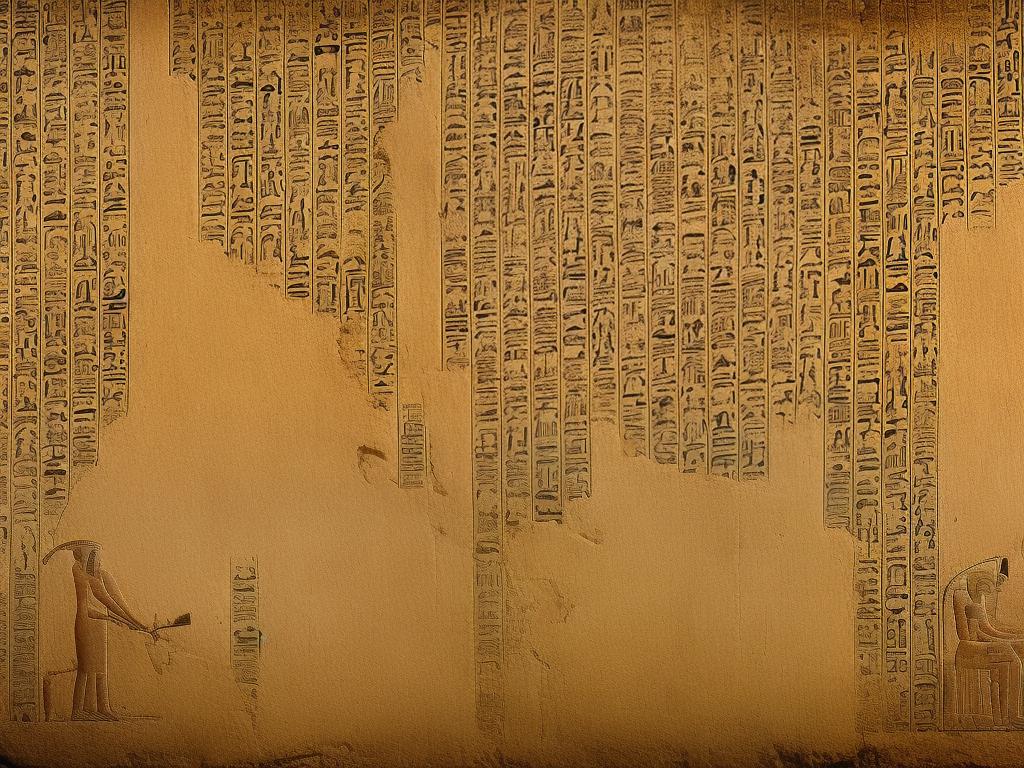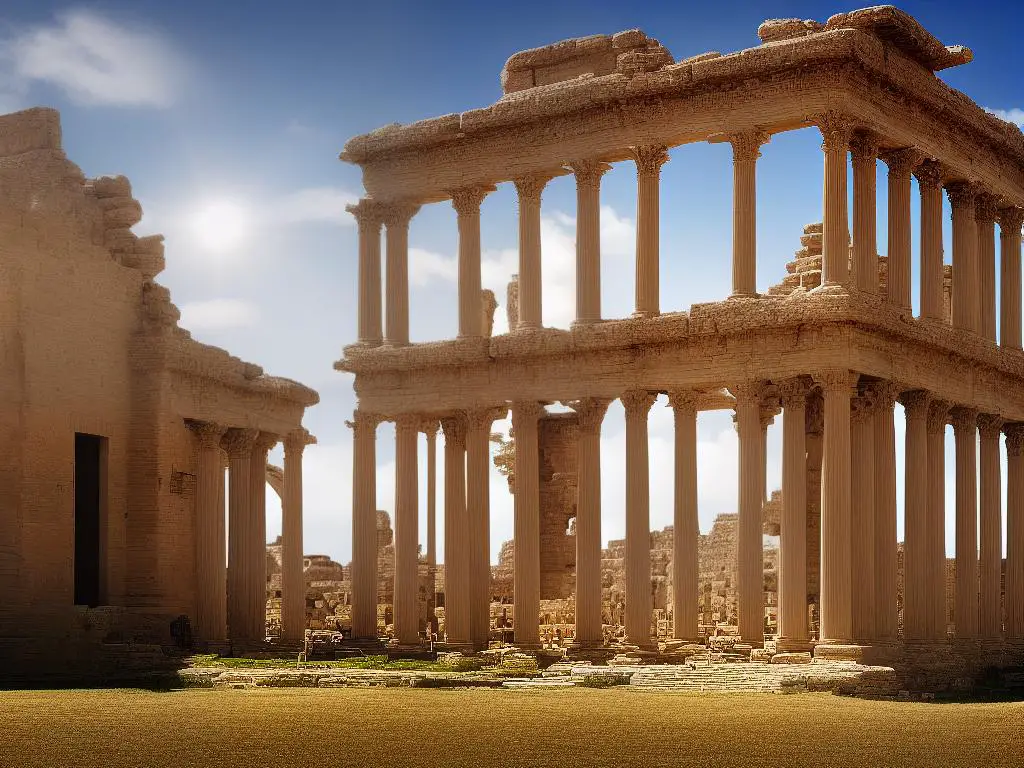Throughout history, dreams have played a vital role in shaping the beliefs, practices and cultures of various civilizations. From ancient Egypt and Greece to Rome and Mesopotamia, the significance and interpretation of dreams have been deeply ingrained in the human experience. In addition, the indigenous cultures of the Americas have also held dreams in high regard, often attributing spiritual and prophetic meanings to them. This exploration of ancient civilizations and their relationship with dreams reveals the diverse ways in which dreams have been perceived and utilized across time and cultures.
Dreams in Ancient Egypt
Dreams in Ancient Egyptian Culture
Dreams held great significance in the ancient Egyptian culture, as they were often considered messages or omens from the gods. In fact, ancient Egyptians believed that the dream world was just as real as the one they inhabited while awake. Hence, dreams carried great weight and were often regarded as important sources of divine insight and prophecy. Egyptians attributed dreams to various deities such as Bes, the protector of households, and Thoth, the god of wisdom. These deities were believed to communicate crucial messages to their worshippers through dreams.
Interpreting Dreams in Ancient Egypt
Priests and physicians were among those responsible for interpreting dreams in ancient Egypt. They utilized dream interpretations not only for determining religious implications but also for practical purposes. For instance, they deduced the cause of an individual’s ill health from their dreams and used this information to make treatment recommendations. There were special ‘dream books’ or ‘dream dictionaries’ that elaborated on the meaning of various symbols, events, and images encountered during dreams.
The Role of Dreams in the Religious Life of Ancient Egyptians
In addition to practical uses, dreams had a significant role in the religious life of ancient Egyptians. They believed that dreams could help serve as a medium through which the living could communicate with the deceased. Oftentimes, individuals who sought answers to specific questions or guidance from their ancestors would spend the night in special dream temples, such as the Temple of Serapis in Memphis, in the hopes of receiving messages in their dreams. The dreams were then interpreted by priests who connected the dreamer with the spirit world and relayed the messages and advice from the spirits.
The Influence of Dreams on the Rich and Powerful
The rich and powerful also sought divine guidance through dreams, to make crucial decisions that impacted the entire civilization. There were instances when Pharaohs dreamt of messages from the gods, which then influenced their policies and actions. One such famous example is the story of Pharaoh Thutmose IV, who dreamt that the Sphinx promised to give him the kingdom if he would clear the sand away from the statue. When the sand was cleared, Thutmose IV became the rightful Pharaoh.
Importance of Dreams in Daily Life
In daily life, ancient Egyptians placed great value on dreams and their interpretations, looking for guidance in all aspects of their existence. They closely observed the symbols and events they experienced in their dream world, discussing them with family members or friends who would offer their thoughts and interpretations. These beliefs and practices surrounding dreams show the deep connection between the spiritual and the mundane in ancient Egyptian culture, illustrating how dreams were seen as powerful bridges between the living world and the divine realm.

Dreams in Ancient Greece
In Ancient Greece
Similar to the ancient Egyptians, dreams were also deemed crucial in ancient Greek society and held immense significance. The Greeks believed dreams to be messages from the gods or warnings about future occurrences. Dreams were also perceived as a gateway to deeper understanding and self-awareness. Moreover, the Greeks had specific gods who were thought to be responsible for sending dreams and making them prophetic, such as Morpheus, the god of dreams known for his ability to take on any human form and appear in the dreams of mortals. The ancient Greeks recognized the importance of interpreting their dreams, which laid the foundation for the practice of oneiroscopy, or dream interpretation.
The Oracle of Delphi
Known as the Pythia, was a priestess who served as the mouthpiece of the god Apollo. She would enter a trance-like state and communicate with Apollo to provide guidance to those seeking answers or advice. Dreams played an essential role in the Oracle’s practice, as people viewed their dreams as highly significant and often interpreted them as divine messages or prophecies. The Oracle’s interpretations were taken very seriously and often impacted crucial decisions made by rulers and individuals alike.
Oneiroscopy
Or the art of dream interpretation, was a widespread practice in ancient Greece that involved the analysis of dreams to provide insight into one’s life or divine guidance. Skilled interpreters, often known as oneirocritics, would interpret the symbols and themes within dreams to make predictions or offer advice. This demonstrates the high importance placed on dreams in ancient Greek society. Many ancient texts, including the works of the philosopher Artemidorus, were dedicated to dream interpretation and analysis, showcasing the prevalence of oneiroscopy in the Greek world.
Certain dreams in ancient Greek mythology
Hold great importance and are famous for their influence on both the characters involved in the narrative and the events within the story. One such example is the story of Penelope who, during her wait for her husband Odysseus to return home, has a dream about an eagle that kills her twenty geese. The dream was interpreted as a prophecy that her husband would finally return and eliminate the suitors vying for her attention. This example highlights how dreams could shape the course of events in ancient Greek myths.
One of the famous dreams in ancient Greek mythology
is that of Agamemnon, the king of Mycenae, who has a dream that convinces him to sacrifice his daughter Iphigenia for the favorable winds needed to sail to Troy. This dream is later revealed to have been sent by the goddess Artemis, who manipulates events to bring about Iphigenia’s death. This story illustrates the power and significance of dreams in ancient Greek mythology, highlighting the belief that they were divinely inspired messages with the potential to alter the course of human lives.

Dreams in Ancient Rome
Moving on to ancient Rome, dreams carried great significance
in various cultural, religious, and political aspects of their society. Much like the Greeks, Romans believed that dreams had the power to offer insights, predict the future, and provide communication with the gods. They thought that gods and other divine beings used dreams as a means to deliver critical messages to mortals. As a result, dreams were seen as powerful tools for acquiring essential knowledge and often influenced decisions in different areas of Roman life.
Prophetic Dreams
One aspect of Roman dream culture involved prophetic dreams. These were dreams that foretold future events or provided guidance to the dreamer. Many Romans believed that these prophetic dreams held great significance and often sought to interpret or analyze them. There is evidence that the knowledge of these dream interpretations was passed down through generations. Ancient literature, such as the works of the poet Virgil, comprises numerous examples of prophetic dreams, highlighting the significance Romans placed on this aspect of their culture.
Superstitions
Superstitions were also quite prevalent within Roman dream culture. Certain symbols or occurrences in dreams were seen as omens for desirable or undesirable outcomes. For example, dreaming of snakes was believed to signify impending treachery or danger, while dreaming of a beautiful garden or lush field could indicate prosperity and abundance. Roman society took these superstitions very seriously, and people felt it necessary to share and interpret their dreams with others. In this way, sharing dreams served as a form of social bonding and allowed the Romans to express their superstitions and beliefs collectively.
Incubation
The practice of incubation, or purposefully seeking guidance through dreams, was also common in ancient Rome. Those in need of answers or advice would visit sacred sites, known as incubation temples, where they would sleep to receive helpful or prophetic dreams. The temples were thought to provide a direct channel to communicate with the gods, and thus, the dreams received at these places were heavily relied upon for important decisions. The practice of incubation reveals the depth of the Romans’ faith in the power of dreams and their perceived connection to the divine.
The lasting significance of Roman dream culture
In ancient Rome, dreams held a crucial role in the daily lives of people as they were believed to possess prophetic power. This belief in the symbolism and importance of dreams is indicative of the ancient Romans’ deep commitment to understanding and interpreting the mysteries of the human mind, even though it might seem outdated by modern standards.

Dreams in Mesopotamian Cultures
Dreams in Ancient Mesopotamian cultures
Similar to the Romans, dreams were also considered to be of great importance in ancient Mesopotamian cultures, such as the Sumerians, Babylonians, and Assyrians. They believed dreams were divine messages from gods or significant omens, carrying valuable information for individuals and society as a whole. Consequently, these civilizations dedicated significant time and effort to recording and interpreting dreams, further emphasizing the vital role dreams played in religious and spiritual practices during this time.
Dream Interpretation in Ancient Mesopotamian Societies
Dream interpretation was an esteemed skill in Mesopotamian societies, with certain individuals called sha’iru (dream interpreters) being highly sought after for their ability to decipher the meanings of dreams. These interpreters often worked closely with priests, who would perform rituals or offer sacrifices in response to the messages received in dreams. Such insights were utilized by ancient Mesopotamian rulers to make critical decisions affecting their kingdoms. For instance, a dream involving a deity might be an indication that the gods were either pleased or displeased with the ruler’s actions, which would then prompt a change in policy or behavior.
One significant example of the importance of dreams in ancient Mesopotamian culture comes from the Epic of Gilgamesh, one of the earliest known pieces of literature in human history. In this epic, the titular hero, Gilgamesh, experiences several dreams that foreshadow critical events and guide his actions in his quest for eternal life. The fact that such a foundational text places considerable importance on dreams underscores their prominence within these ancient civilizations.
Recording of Dreams on Clay Tablets and Modern Studies
Mesopotamian scribes often recorded dreams on clay tablets, which they would then present to dream interpreters or priests for deciphering. Many of these tablets have survived to this day, granting modern scholars invaluable insight into the daily lives, beliefs, and customs of these ancient peoples. Through the careful study of these texts, historians have been able to piece together a clearer understanding of the worship practices, pantheons, and religious rites that were integral to Mesopotamian civilizations.
The Connection between Dreams and Spiritual Beliefs in Ancient Civilizations
In many ancient civilizations like Mesopotamia, religious and spiritual beliefs shaped nearly every aspect of life, including their understanding of dreams. Dreams were closely linked to the gods and their divine will, providing a direct line of communication between humans and the divine realm. The Sumerians, Babylonians, and Assyrians placed significant emphasis on decoding and responding to these messages, emphasizing the inextricable connection between dreams and the spiritual underpinnings of their cultures.

Dreams in Native American Cultures
Dreams in Native American Cultures
Similarly, dreams have held a significant position in Native American cultures, as they were believed to be a gateway to the spiritual world. Tribes across North America regarded their dreams highly, believing these carried messages from their ancestors, spirits, and the Great Spirit, or the higher power responsible for creation. Just like ancient Mesopotamians, Native American people harnessed dreams to make important decisions regarding their families, communities, and spiritual pursuits. Dreams were often seen as prophecies, guiding visions, or a means to access sacred knowledge passed down through generations.
Interpretation of Dream Symbolism
In many Native American cultures, the meaning behind dream symbolism was a vital aspect of daily life. Dreams were carefully examined and interpreted by a tribe’s dream interpreter, or medicine man, who would provide insights and advice based on the dream’s message. Dream symbolism was often rooted in the natural world, with animals and plants playing pivotal roles as spiritual guides or omens. For example, an encounter with a bear in a dream may be interpreted as a forthcoming challenge requiring strength and courage, while a dream featuring a soaring eagle could signify the dreamer’s upward spiritual journey.
The Role of Dreams in Spiritual Practices
Dreams also played an indispensable role in Native American spiritual practices. Many tribes performed ceremonies and rituals to invoke dreams as a means of communication with the spiritual world. The Ojibwa, for instance, created dream catchers, made of a web woven around a circular frame, which were believed to catch bad dreams while allowing good dreams to pass through to the sleeper. The dream catcher has subsequently become an iconic symbol of Native American spirituality and protection, widely known today beyond indigenous communities.
The Vision Quest
Another noteworthy spiritual tradition centered around dreams is the vision quest, a rite of passage practiced by numerous Native American tribes, particularly among the Plains Indians. The vision quest involves a period of solitary fasting and intense prayer in a secluded area, wherein the individual relies on their dreams and visions to direct them in their life’s spiritual journey. The vision quest often culminates in the dreamer receiving a guiding animal spirit or a unique vision that will provide wisdom and guidance throughout their life.
The Significance of Dreams in Today’s World
In many Native American societies, dreams have been an essential component of both their ancient and modern lives, playing a significant role in their spirituality and daily routines. Concepts such as dream interpretation, dream catchers, and vision quests are still held in high regard and continue to connect individuals with the wisdom of their ancestors, the natural world, and the guiding powers of their spiritual journey.

Comparing Dream Beliefs and Practices
Exploring the Importance of Dreams in Ancient Civilizations
Studying the dream beliefs and practices of ancient civilizations offers a captivating understanding of how these societies perceived and incorporated the importance of dreams in their daily lives and spiritual beliefs.
Ancient Egypt
In ancient Egypt, dreams were considered important messages from the gods, often carrying divine revelations and prophetic meanings. Egyptians believed that incorporating dream symbolism could influence their future, thus they would seek guidance from professional dream interpreters.
Ancient Greece
In contrast, the ancient Greeks associated dreams with the inner workings of the human psyche, viewing them as a portal to the unconscious mind. Greek philosophers and physicians like Heraclitus and Hippocrates believed that dreams could provide crucial insights into a person’s mental and physical health. They felt that analyzing dreams allowed them to tap into hidden desires, thoughts, and emotions. Additionally, dreams were seen as a vital tool for gaining divine knowledge in the form of prophetic oracles, which played a significant role in ancient Greek society.
Ancient Mesopotamia
The ancient Mesopotamians, comprising the Sumerian, Assyrian, and Babylonian cultures, also held a deep belief in the significance of dreams. Dreams carried strong religious meanings and were thought to be the channel through which the gods communicated their will to humanity. Dreams could be prophetic, carrying warnings of future events, or could provide guidance in important decisions. Mesopotamian kings often took dreams very seriously, consulting priests for dream interpretations to help guide their decisions in matters of state and religious affairs.
Ancient Mayans
The Mayans of Central America were another civilization that placed significant emphasis on the importance of dreams. They believed that dreams possessed both a divine and personal relevance that could help one attain heightened spiritual and emotional states. The Mayans believed that their ancestors could communicate with them through dreams, and sought to use dreams as a means of connecting with the sacred realms of their deity. It is thought that Mayan priests and shamans would induce trance-like states through the use of hallucinogenic substances to facilitate the reception of prophetic dreams.
Ancient China
In ancient China, dreams were viewed as valuable sources of wisdom and guidance. The Chinese believed that the dream world and the physical world were closely interconnected, and that dreams provided an opportunity for the soul to travel to other realms. Confucius and other Chinese philosophers emphasized the importance of interpreting dreams as a way to understand one’s own nature and gain spiritual insights. Dreams were often seen as omens or prophecies and could carry messages from the spirits of deceased ancestors, which held significant value in Chinese society.
Overall Beliefs
While there were unique aspects to the specific beliefs and practices of each ancient civilization regarding dreams, it is clear that dreams held an important place in the lives of these societies. They were often seen as a means of communication with the divine, prophetic visions, or ways to gain insight into one’s own thoughts and emotions. This shared belief in the power and significance of dreams demonstrates a universal human experience and curiosity across cultures and time.

Photo by michaeldam on Unsplash
Ultimately, the study of dreams in ancient civilizations provides a fascinating glimpse into the human psyche and the diverse cultures that have sought to understand and harness the mysterious realm of the dream world. While the specific beliefs and practices surrounding dreams may vary from one civilization to another, a common thread linking them all is the recognition of the power and influence that dreams can wield. Whether viewed as divine revelations, prophetic messages, or guides for spiritual journeys, dreams encapsulate the enduring quest for meaning and understanding that continues to shape the human experience to this day.
